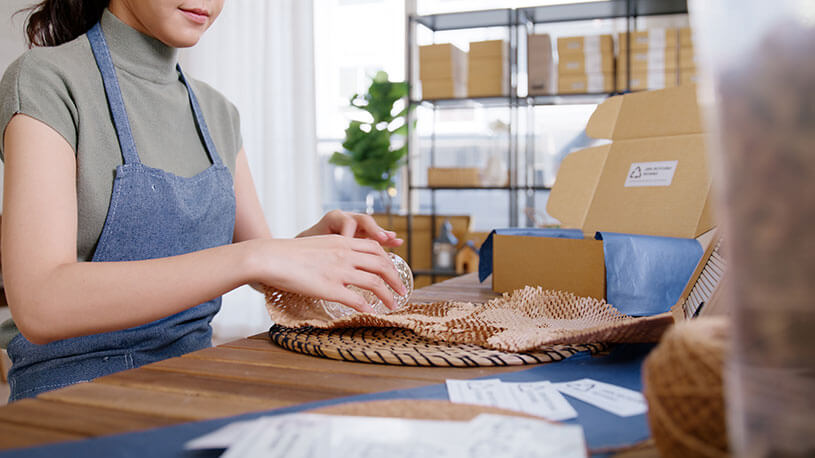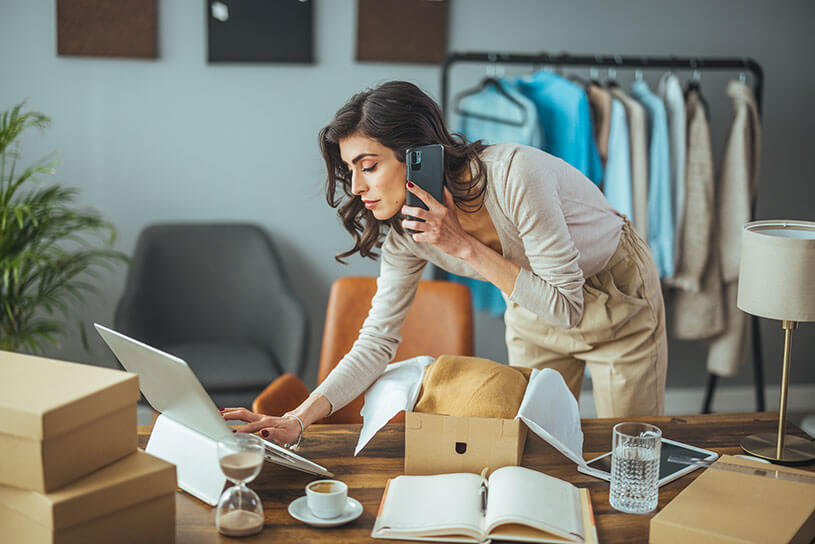Using eco-friendly packaging for your business can help improve your green credentials, attract customers to your brand, and protect the environment.
As people, government, and organisations are increasingly looking at ways to be more sustainable, small businesses are looking for alternatives to plastic when it comes to products and packaging.
What’s more, consumers are voting with their wallets when choosing brands that care about the planet. The good news is that eco-friendly materials for food, products, and deliveries are out there – and they needn’t be expensive.
So whether you’re an online retailer, developing products, or running a takeaway, this guide offers sustainable alternatives to plastic packaging you can use for your small business. As well as tips on what materials to look for and top eco-friendly suppliers, we’ve got stories from real businesses that have put sustainability at the centre of their strategy.
Here’s what we’re going to cover:
- the importance of using sustainable packaging
- tips for finding sustainable packaging
- packaging companies and how to choose a supplier
- real businesses using sustainable packaging
Importance of using sustainable packaging
Save our planet – the Earth has finite resources so using materials for your single-use packaging that can be recycled or are naturally renewable can reduce your impact on the environment.
Reduce your carbon footprint – the UK has a legally-binding target to reach net zero by 2050 and all businesses have a part to play in this. Make sure you’re ahead of net zero laws and compliance by reviewing your business practices.
Consumers want eco-friendly packaging – a report from Deloitte in 2024 found 37 per cent of consumers have chosen brands that have environmentally sustainable practices or values when shopping. And 61 per cent have limited the use of single-use plastic (including buying items with less packaging).
Brand identity – using excessive packaging can create a negative feeling among consumers, but making conscious choices for the environment can positively demonstrate your sustainable mission and values as a company.
Supports your sustainability goals – half of small businesses (51%) say that sustainability is a high priority for their business, but only 25 per cent think their own business will meet net-zero by 2050 (FSB, 2025 report).
Save money – saving energy and cutting waste can reduce your costs, and policies such as the plastic packaging tax mean buying recycled plastic will get more expensive.
Manage your supply chain – further regulations requiring businesses to report their ESG (environmental, social, and governance) are on the way. While this primarily affects bigger firms, it will affect smaller businesses if you supply to these larger companies.
Read more: How to create an ESG (environmental, social, and governance) strategy

61%
Consumers limited the use of single-use plastic (including buying items with less packaging)*

1 in 4
Prepared to pay more for goods and services if brands are committed to sustainability practices (24%)*

45%
18-24 year-olds have stopped buying brands or products if they have concerns about their sustainability*
*Survey of UK adults in Deloitte’s The Sustainable Consumer report in 2024
New recycling rules requiring businesses in England to separate their recyclable, non-recyclable, and food waste came in to force in March 2025.
Tips for finding sustainable packaging for small businesses
It can be tricky to know where to start when it comes to finding sustainable packaging solutions for your small business. But the first thing to look at is what your packaging is made of.
Materials should be reusable, biodegradable, or compostable. This reduces the environmental impact in terms of production and cuts the amount of single-use items going straight to landfill.
So whether you’re selling food, drinks, or products, these are the main things to consider when trying to improve the sustainability of your packaging:
- Use the smallest box you can – this makes packaging and deliveries as efficient as possible.
- Source materials that can be easily recycled, such as paper, cardboard, glass, or metal.
- Plant-based packaging made from sugarcane, bamboo, or hemp is naturally renewable so doesn’t drain resources.
- Plantable packaging like seed paper with wildflowers or herbs is compostable and can be enjoyed by your customers afterwards.
- Source from suppliers that are ethical and environmentally friendly in their ethos.
- Consider the environmental impact of your alternative materials to plastic – it’s not always just a case of switching from one to another.
- Avoid PVC and polystyrene packaging.

Hivewrap is a strong, paper-based alternative to bubble wrap. Photograph: ChayTee/stock.adobe.com
As you get further into the process of selecting new packaging materials, you’ll probably want to:
- get samples to find what sustainable packaging is right for your business, and don’t change everything all at once
- review your packaging design to make sure you’re not using any harmful chemicals or adding too much to the packaging that makes it difficult to recycle
- consider introducing a bulk return scheme – customers can send back boxes or containers that can be reused again and again
When reviewing your sustainability goals, it’s important to avoid ‘greenwashing’ and labelling things as eco-friendly when they’re not reducing environmental impact. Always be upfront about where you’re at and humble that there’s still a way to go.
Focus groups and customer surveys can be useful to help you understand if your sustainable packaging is doing its job well or ways you can improve. While considering a circular economy is important when you’re developing a new product, make sure packaging design and the product itself take care to reduce environmental impact wherever possible.
Sustainable packaging for food – examples
If you’ve got a takeaway business or café then thinking about the types of packaging you can use for food and drinks is important. From food containers to drinks cups, the industry can generate a lot of waste as everything is designed to be used once.
But there are sustainable food packaging options out there, including:
- compostable packaging
- glass jars – for example for sauces that can be returned or reused
- biodegradable packaging for food containers (rather than single-use plastic)
- paper bags and straws (rather than plastic)
Avoid PVC, low density polyethylene, and polystyrene as these aren’t easily recyclable or the manufacturing process releases chemicals and can harm the environment.
Don’t sacrifice food safety
Food hygiene and safe storage should remain a primary concern when looking at suitable packaging though. And it’s worth noting that the Food Standards Agency (FSA) is currently investigating the safety of products made from bamboo mixed with plastic (items made solely from bamboo are safe however).
Sustainable packaging for products
If you sell products online then finding suitable packaging that protects what’s inside while being durable, affordable, and sustainable is likely a key part of your business strategy.
Sustainable box packaging for online retail businesses includes:
- recycled cardboard boxes
- plastic-free tape
- plastic-free padded envelopes
- compostable/dissolvable packing peanuts
- corrugated packaging
- paper bubble wrap
You could also consider reusable materials like glass jars, metal tins, and fabric bags.
Y.O.U underwear is one small business that’s got sustainability at its heart. Products are made from Fairtrade and GOTS-certified organic cotton and are packaged in reusable organic cotton bags.
The retail brand was awarded a £25,000 grant from Simply Business in 2022, which the founder Sarah Jordan said at the time would enable them to “implement our long-held dream of a fully circular fibre-to-fibre recycling programme.”
Sustainable packaging companies – how to choose a supplier
There’s a few ways you can assess a supplier’s environmental impact, including:
- FSC® Certification – making sure that paper/cardboard fibre used in packaging comes from responsibly managed forests
- recyclable materials – look for products that can be easily recycled or home compostable
- plastic-free alternatives – such as paper-based wraps, tapes, and pallet wrap
- B Corp accreditation – companies are assessed based on their environmental practices in five key areas (governance, workers, community, customers, and environment)
Alternatives to plastic
These packaging suppliers have achieved B Corp status and offer a range of eco-friendly alternatives to plastic packaging:
| Company | Environmental focus | Product examples |
| Better Packaging Co | Affordable and innovative eco-packaging for businesses of all sizes, focused on reducing plastic pollution and preventing it entering the oceans. | POLLAST!C® poly mailers – made from 100 per cent recycled Ocean Bound Plastic (OBP). Compostable mailers/poly bags – certified home compostable and fully biodegradable, partly made from plants. |
| Grounded | Sustainable packaging for food and ecommerce businesses. Their strategy focuses on Plantmade (renewable materials), Wastemade (made with less), and Papermade (using FSC certified recycled material). | Compostable pouches – uses rapidly renewable plant-based materials that can be composted. Recyclable Ocean-bound rPET thermoforming film – made from 100 per cent Ocean-bound (PCR) PET (post-consumer recycled) creates value from waste and fuels circular systems. |
| The Wool Packaging Company | A UK business offering temperature controlled packaging, and 100 per cent pure sheep’s wool as an alternative to unsustainable insulation like expanded polystyrene. | Woolcool® insulated packaging (e.g. box liners or fleece liners) – a natural and renewable material that provides thermal insulation for food and pharmaceutical products. Offers active reuse, recycle and return schemes for their insulated packaging. |
| Swiftpak | A carbon neutral certified business that provides sustainable packaging for home products, electricals, and food and drink. | Sustainable corrugate and pallets (cardboard/paper) – recyclable and paper-based. |
Sustainable cardboard packaging
If you’re looking for sustainable cardboard packaging and cartons, these companies also have strong environmental credentials:
| Company | Environmental focus | Product examples |
| Priory Direct | A carbon neutral company with sustainable boxes from responsibly managed forests. | Priory elements EcoMailingBags (paper mailing bags) Phenol-free thermal labels (replacing a concern for chemicals in the supply chain with an environmentally conscious option). |
| Reusabox | Embraces circular economy principles by selling recycled and used boxes from organisations and brands. They also contribute to reforestation projects. | Used cardboard boxes – high quality boxes that can be reused instead of recycled. Used cardboard octabins and pellet boxes (heavy duty boxes for shipping). |
| Curtis Packaging | UK carton manufacturer with sustainable packaging, including vegetable/soya based inks as a cleaner alternative to oil-based ones. They are also a zero waste to landfill company. | Cartons made from 100 per cent post-consumer waste paperboard. CurtCHROME® coating – an alternative to foil that can be easily recycled. |
Sustainable packaging for food and drinks businesses
Whether you run a food van, takeaway, or a small café, these companies offer sustainable packaging options for your business.
| Company | Environmental focus | Product examples |
| Green Man Packaging | Certified compostable packaging made from plants for food service. | Compostable coffee cups, lids, straws, and takeaway boxes. |
| Packaging Environmental | Compostable and recyclable food and drink packaging. | Compostable bagasse trays, recyclable rPET lids, compostable pulp bowls. |
Once you’ve chosen your eco-friendly supplier and materials, make sure your business is protected against loss or damage during shipping. Get a quick quote for online retailer insurance today. Or protect your food business with stock cover or our public liability cover for cafés.
Real businesses – sustainable packaging examples
Here’s a few examples of brands that boast sustainable packaging as part of their mission:
Who Gives A Crap – deliveries are carbon neutral and packaging is plastic-free with playful messaging on the box.
CanO Water – avoids single-use plastic by selling water in resealable cans.
For peats sake! – packages environmentally friendly peat as small as possible, to save on large boxes making deliveries as efficient as possible.
Read more: How to set up an online shop – a step-by-step guide
No quick fix, but important to start somewhere
Packaging can’t be considered in insolation when on your sustainability journey – but it’s a start. The packaging materials, the environmental impact of creating it in the first place, and the waste it creates afterwards are all areas that can have an impact on the planet. Whatever you do, it’s important to explore different options, speak to your customers, and find what’s best for your business and your budget.
Read more small business guides
Ready to set up your cover?
As one of the UK’s biggest business insurance providers, we specialise in public liability insurance and protect more trades than anybody else. Why not take a look now and build a quick, tailored quote?
